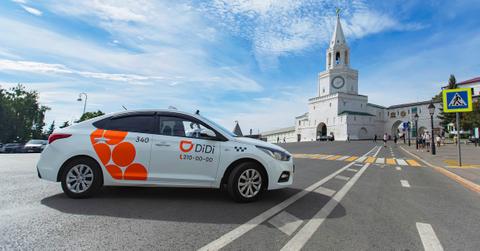Why DiDi Stock Makes for a Compelling Investment Case
DiDi stock went for a U.S. listing and has seen positive investor sentiment until now. What is DiDi's stock forecast for 2025 and will it go up?
July 2 2021, Published 11:04 a.m. ET

DiDi, the Chinese rail-hailing firm, was one of the most anticipated Chinese IPOs since Alibaba got listed in 2014. It was also one of the shortest investor pitches. The company priced its IPO just three days after launching its roadshow. Investors want to know if DiDi stock will go up.
In addition to ride-hailing, DiDi offers bike-sharing, taxi, food delivery services, and more. DiDi launched its IPO when the demand for ride-hailing services is increasing as COVID-19 cases decline and vaccinations are administered. The company provided services to over 493 million annual active users for the 12 months ended March 31, 2021. It also reported $24.9 billion in revenues in the same period.
DiDi stock valuation
DiDi, the so-called "Chinese Uber," got listed on the NYSE on June 30 under the ticker symbol “DIDI.” The company priced its IPO at $14, which was at the higher end of its price range of $13–$14, and raised nearly $4.4 billion. This gave it a valuation of nearly $67 billion. The stock started trading at $16.65, which was almost 19 percent above its offer price of $14. In August 2020, DiDi was valued at $62 billion in a private funding round. Therefore, the company’s offer price implied just an 8 percent premium to its last valuation.

DiDi’s current market cap of $68 billion is lower than its U.S. peer Uber’s 93 billion and higher than Lyft’s $20 billion. DiDi is trading at 2020 price-to-sales multiple at 3.3x. Uber and Lyft are trading at NTM EV-to-sales multiples of 5.6x and 5.4x, respectively.
DiDi stock forecast 2025
On June 30, Atlantic Equities analyst Xiao Ai initiated coverage of DiDi Global with an overweight rating and a target price of $25. The target implies an upside of 77 percent from its last closing price. Xiao thinks that DiDi’s position in the Chinese ride-sharing market is secure with more than 80 percent market share. The analyst also thinks that the continuing recovery from the COVID-19 pandemic should benefit the company in the near term.
The Chinese urban population and disposable income are expected to keep rising at a healthy clip. With nearly 80 percent market share, DiDi should be a major beneficiary of this trend. China’s shared mobility is also expected to grow at nearly 30 percent per year over the next five years, which is higher than the average growth rate for the global market. It's forecast to grow from 233 billion yuan currently to 862 billion yuan in 2025.

Is DiDi a good long-term investment?
Given the long-term secular tailwinds that DiDi is exposed to in China, it could be a big-time winner in the ride-hailing business in China. After a long-fought battle, Uber was forced to sell the Chinese segment of its business to DiDi. While ride-hailing firms, including Uber and Lyft, aren't profitable on an overall basis currently, DiDi is profitable in its core mobility business. It's profitable due to the impact of growth in international markets and businesses like shared bikes, while it's seeing losses on an overall basis. DiDi has a high chance of turning profitable on an operating basis soon.
With strong growth prospects and chances of profitability soon, DIDI stock is trading at a significant discount to Uber and Lyft. While some of the discount is warranted given that it's a Chinese entity and the U.S. has mandated to delist Chinese companies that don't follow proper audit procedures for three years, the current discount is excessive. This makes a strong investment case for DIDI.
